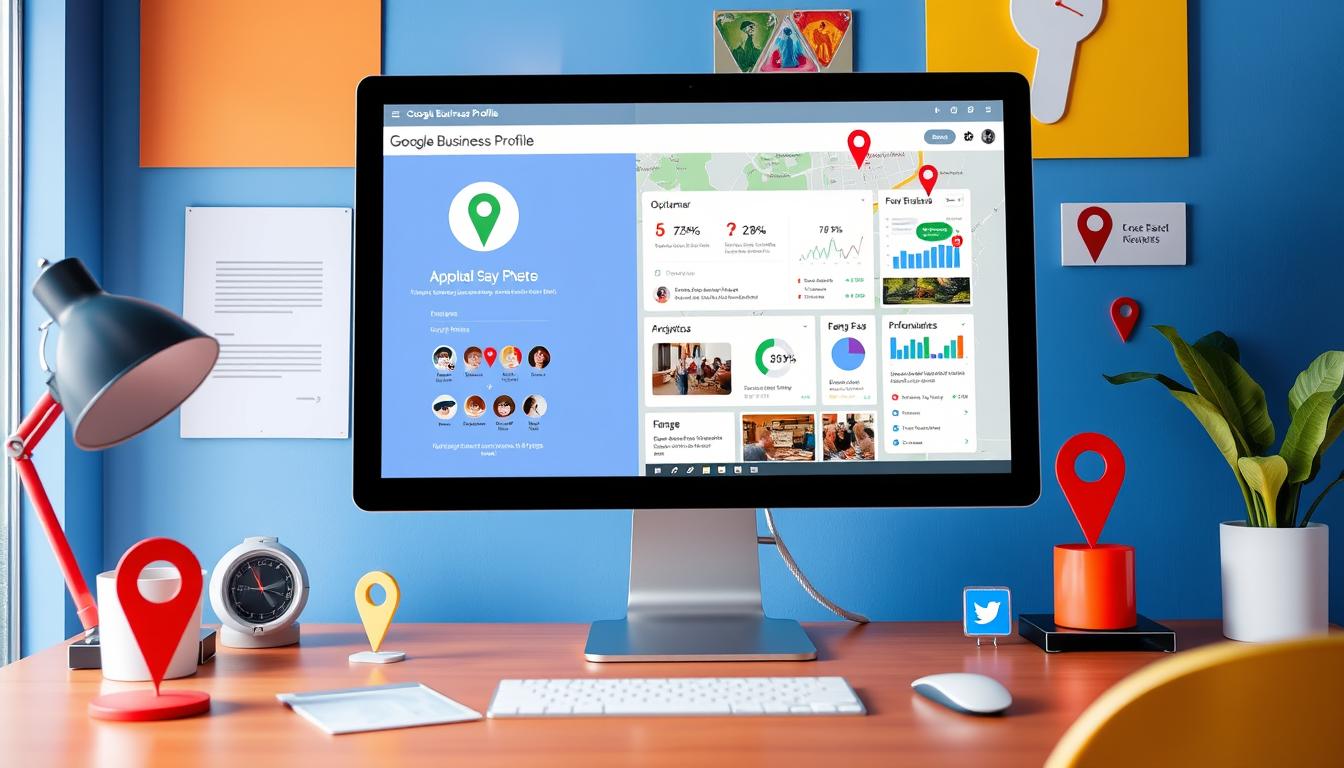
Your Ultimate Guide to Finding Keyword Ranking for Your Site
To find keyword ranking and check keyword rankings, you need to understand the importance of keyword research in SEO. Keyword research is key to SEO. It’s about finding the keywords people use to search for what you offer. By tracking these keywords, you can boost your online presence and draw more visitors to your site.
Starting this journey will show you how complex keyword research is. You’ll see how it affects your site’s ranking. You’ll learn to track keyword performance, spot trends, and use this info to shape your SEO plan.
Key Takeaways
- Keyword research is essential for SEO success and involves identifying relevant keywords
- Tracking keyword performance helps you understand your website’s ranking
- Regular rank tracking identifies trends and patterns in keyword performance
- Effective keyword research enhances content relevance and attracts targeted traffic
- Understanding search intent is key for content creation and aligning your strategy
- Relevance, authority, and volume are key elements in keyword research that impact ranking
Understanding Keyword Rankings and Their Importance
Knowing about keyword rankings is key to making your website more visible. By monitoring search rankings, you can see how well your site does in search results.
Let’s dive into what keyword rankings mean:
What Are Keyword Rankings?
Keyword rankings show where your website stands in search engine results for certain terms. For example, being first for a popular keyword can really help your site be seen more.
Why Keyword Rankings Matter for SEO
It’s important to track keyword position because better rankings mean more visitors. The top spot on Google gets about 28% of clicks. But, the tenth spot gets less than 3%.
The Impact of Rankings on Website Traffic
Your ranking affects how many people visit your site. By picking the right keywords and tracking Google keyword rankings, you can draw in more visitors. Being high up in search results not only makes your site more visible but also more trustworthy, leading to better results for your business.
Essential Tools to Find Keyword Ranking
Keeping an eye on your seo ranking check is key for a strong online presence. Using trusted keyword rank checker tools gives you the right insights into your site’s performance.
SEMrush is a top choice with its detailed analytics and ability to track many keywords worldwide. Ahrefs is also popular for its deep backlink analysis and keyword tracking. For those on a budget, Google Search Console offers vital data on keyword rankings for free.
When picking a tool, look at its accuracy, how often it updates, and if it can watch your competitors. Good tools show real-time changes, which is vital with Google’s frequent algorithm updates. Tools that track local and international SEO help you target specific markets.
Good how to check keyword rankings methods do more than just track positions. They also show how your SEO efforts are doing. With most users sticking to the first page of search results, the right tools can boost your site’s visibility and traffic.
Manual Methods for Checking Your Rankings
Automated tools are great, but knowing manual methods can give you deeper insights. These methods let you see how your site ranks in search engines yourself.
Using Google Search Console
Google Search Console is a free tool that helps track your website’s rankings. It shows data on clicks, impressions, average position, and CTR. This lets you see your keyword rankings right from your dashboard.
By checking the Performance report often, you can keep an eye on your SEO. This helps you make better decisions to boost your site’s visibility.
Browser-Based Search Techniques
Browser-based search techniques are another way to track rankings. Using incognito mode gives you unbiased results. This helps you see your ranking more accurately.
Also, doing location-specific searches can show how your site ranks in different areas. This is useful for targeting different regions in the UK.
Understanding Search Results Pages
It’s important to understand search results pages to monitor your SEO. Knowing about featured snippets, local packs, and organic results is key. This helps you see how they affect your site’s visibility.
By tracking your rankings in these contexts, you can plan better. This can help you improve your spot on the Search Engine Results Page (SERP).
Professional Rank Tracking Solutions
Using a seo keyword tracker can really boost your search engine position tracking efforts. These tools have features made for businesses serious about SEO.
These tools give you daily updates on your keyword rankings. You can track many keywords important to your business. They also let you see how you compare to your competitors.
Top tools like Conductor, BrightEdge, and Moz Pro are known for their strong features. They offer keyword rank monitoring strategies with features like white-label reports and API access.
Here are the 12 best rank trackers to look at:
- Semrush
- SEO Tester Online
- Ahrefs
- Nozzle
- Advanced Web Ranking
- Moz Pro
- Rank Tracker
- Mangools
- Keyword.com
- SE Ranking
- AccuRanker
- Nightwatch
How Search Engines Determine Keyword Rankings
It’s key to know how search engines rank keywords to boost your website’s SEO. Google and others use complex algorithms to check many factors. These factors help decide how visible your site is.
Google’s Ranking Factors
Google looks at over 200 things when ranking keywords. Important factors include the quality of your content, backlinks, site speed, and how easy it is for users to navigate. Using tools to track your keywords can help you improve these areas. Also, knowing how competitive certain keywords are can guide your strategy.
Local vs Global Rankings
Whether you aim for local or global audiences affects your keyword strategy. The volume of searches for keywords is a big factor. For local rankings, using keywords specific to your area can help you stand out. But for global rankings, you need a wider range of keywords to reach more people.
Mobile vs Desktop Rankings
More people use mobile devices now, so search engines rank mobile and desktop differently. Making sure your site works well on mobile is essential. How well your site performs on different devices can impact your keyword rankings.
| Ranking Factor | Impact on SEO |
|---|---|
| Content Quality | High-quality, relevant content improves rankings. |
| Backlinks | Quality and quantity of backlinks enhance authority. |
| Site Speed | Faster sites offer better user experience, boosting rankings. |
| User Experience | Easy navigation and mobile friendliness contribute positively. |
| Keyword Competition Analysis | Understanding competition helps in targeting achievable keywords. |
Common Challenges in Keyword Rank Tracking
Tracking your keyword rankings is key, but it’s not without its challenges. You might see ups and downs that aren’t always easy to understand. These changes can come from many keyword ranking factors affecting your site’s spot.
- Algorithm Updates: Search engines often change their algorithms, leading to unexpected ranking shifts.
- Personalised Search Results: Search results can vary based on what each user sees, making it tough to get clear insights.
- Local Search Discrepancies: Search results can differ by region, making tracking harder.
- Mobile vs Desktop Variations: Rankings can change between mobile and desktop, needing different strategies for each.
- Tracking Across Multiple Locations: Keeping track of rankings in different areas or languages adds to the complexity.
- Voice Search Challenges: With voice assistants becoming more popular, it’s vital to adjust your keyword optimisation strategies.
To tackle these challenges, it’s important to grasp the keyword ranking factors and use good keyword optimisation strategies. Keeping your methods up to date can help you improve keyword ranking even with these hurdles.
Analysing Your Keyword Performance Data
Knowing how your keywords perform is key for your SEO strategy. By monitoring keyword rankings, you can make smart choices to boost your website’s visibility.
Key Metrics to Monitor
There are more than just rankings to look at:
- Click-Through Rates (CTR): Shows how many users click on your link.
- Impressions: Counts how often your keyword shows up in search results.
- Average Position: Tells you your keyword’s average spot in search results.
Creating Performance Reports
Reports help track your progress and spot trends:
- Use tools like SEMRush and Ahrefs to collect data.
- Add charts and graphs to show changes over time.
- Point out areas for improvement and successes.
Setting Ranking Benchmarks
Set realistic goals to guide your SEO work:
- Look at your industry’s standards and competitors.
- Set goals based on your current performance.
- Update your benchmarks as your strategy and market change.
| Metric | Description | Tools to Use |
|---|---|---|
| Click-Through Rate | Percentage of users clicking your link | Google Search Console, SEMRush |
| Impressions | Number of times keyword appears in results | Ahrefs, Google Search Console |
| Average Position | Average ranking position of keyword | Accuranker, SEMRush |
| Traffic Volume | Estimated visitors from keyword | SEMrush, Ubersuggest |
Strategies to Improve Your Keyword Rankings
To boost your keyword ranking, mix different strategies that fit your website. Focus on key factors to climb the search rankings.
On-Page Optimisation Techniques
Optimising each web page is key. Start with title tags and meta descriptions that grab attention. Use header tags to organise your content, helping search engines get it.
Content Enhancement Methods
Keep your content fresh and relevant. Create topic clusters around your main keywords. This boosts your content’s value and authority.
Technical SEO Considerations
Your website should load fast and work well on mobiles. These are important for rankings. Use structured data for better indexing and check your backlinks often.
Using these strategies can greatly improve keyword ranking. It will also make your website more visible in search results.
Advanced Rank Tracking Methodologies
To improve your SEO, you need to use keyword rank monitoring strategies that give you deeper insights. These advanced methods offer more than just basic tracking. They help you stay competitive.
SERP feature tracking is key. It lets you monitor things like featured snippets and local packs. This can greatly increase your visibility on search engine results pages.
Understanding how these features work with your content is vital. It helps you make targeted improvements.
Competitor analysis is also critical in search engine position tracking. A good seo keyword tracker lets you see how you compare to others. You can find gaps in your strategy and improve your position.
Using rank tracking with other SEO tools gives you a full view of your online performance. Tools like Semrush and Ahrefs help you link ranking data with traffic and sales. This makes it easier to make informed decisions.
Predictive rank tracking uses machine learning to guess future rankings. It helps you adjust your strategy early. This way, you can keep growing and adapting in the changing search world.
Integrating Rankings with Other SEO Metrics
Knowing your keyword rankings is key, but combining them with other SEO metrics gives a full view of your site’s performance. This way, you can make better decisions that lead to real results.
It’s important to link your rankings with your conversion rate. This shows which keywords bring in visitors and also lead to actions like buying or signing up. By tracking how each keyword does in conversions, you can improve your SEO plan.
Conversion Rate Correlation
Connecting keyword positions with conversion rates shows which terms are most profitable. By looking at which keywords lead to the most conversions, you can focus on those that help your profits grow.
Traffic Quality Assessment
Checking traffic quality means looking at bounce rate, time on site, and pages per session alongside your keyword rankings. Keywords that rank high and keep users engaged show quality traffic. But, high bounce rates might mean your keywords are off target.
ROI Measurement
Measuring the return on investment (ROI) of your SEO shows how your rankings affect your business. By figuring out the revenue from top-ranking keywords and the costs to get there, you can see if your SEO is working.
By combining these metrics, you get a detailed SEO dashboard. It shows not just how you find Google rankings for keywords but also how those rankings affect your business. This all-in-one view makes sure your SEO matches your business goals, leading to lasting growth and success.
Future-Proofing Your Ranking Strategy
Search algorithms keep getting smarter. To stay ahead, you need a flexible strategy. Focus on voice search optimisation to meet the needs of users who talk to their devices.
Using keyword ranking tools is key. They help you see how keyword search volume changes and who you’re up against. This info lets you quickly adjust to new rules and keep your rankings high.
- AI and Machine Learning: Use AI to guess what users want and make content just for them.
- E-A-T Principles: Show you’re an expert, authoritative, and trustworthy to gain credibility.
- Structured Data: Add schema markup to help search engines understand your content better.
- Visual Search: Make your images and videos search-friendly to catch visual searches.
Keep your content fresh to show search engines it’s relevant. Use long-tail keywords that match what users are looking for. Also, try reaching people on platforms like YouTube and Instagram to expand your audience.
| Keyword Ranking Tool | Key Features | Price |
|---|---|---|
| SEMrush | Comprehensive keyword analysis, competitor tracking, SEO audits | Starting at £99.95/month |
| Ahrefs | Backlink analysis, keyword research, content explorer | Starting at £99/month |
| Moz Pro | Keyword explorer, site audits, rank tracking | Starting at £99/month |
By using these strategies and doing good keyword competition analysis, your SEO will be ready for the future. Focus on making content that’s real and meets user needs. This will help you keep and grow your online presence.
Conclusion
It’s key to keep an eye on your website’s ranking in search results. Tools like Google Search Console and SEMrush help a lot. They show you how well your keywords are doing and who you’re up against.
By checking your rankings regularly, you can spot chances to improve. For example, keywords in positions 11 or 12 are great for quick wins. This helps your site show up better in searches.
Keeping track of how your keywords are doing is a continuous job. Google Analytics and SEMrush give you important data. This lets you see how people interact with your site and make it better.
Make it a habit to check your rankings, whether daily or weekly. This keeps you up to date with how your site is doing. By always improving your strategy, you’ll get more people visiting your site.
FAQs
Keyword ranking shows where your website stands in search results for certain words. It's key because better rankings mean more people see your site. This can lead to more visitors and better sales. Knowing your rankings helps you make your content and SEO better.
Use tools like SEMrush, Ahrefs, and Google Search Console to check rankings. These tools give you detailed info on your keywords and how they change over time. You can also do quick checks by searching incognito.
Top tools include SEMrush, Ahrefs, Moz Pro, and Google Search Console. They track your keywords, compare with others, and show how competitive they are. Pick the best one for your needs, budget, and how detailed you want your analysis to be.
Use SEO tools to keep an eye on your rankings regularly. Track many keywords, look at trends, and compare with rivals. Also, link your tracking to analytics to see how it affects your site's traffic and sales.
Improve rankings by optimising your website. Make sure your title tags, meta descriptions, and headers are good. Create valuable content that meets user needs. Get authoritative backlinks and make your site fast and mobile-friendly.
Yes, advanced tools let you see how your site ranks on various devices and places. This helps you understand your site's performance in different situations. You can then adjust your SEO to reach specific groups better.
You might see ranking changes due to updates, personalised search results, and tracking in different places or languages. Keeping up with SEO changes and adapting to new trends is also a challenge. But it's key for accurate tracking.
Professional solutions like Conductor, BrightEdge, and Moz Pro offer more features. They give daily updates, track many keywords, and do deep competitor analysis. They also have reporting and API access for big businesses needing a full SEO package.
Use analytics to link your rankings with other SEO metrics. This way, you can see how your SEO efforts are doing. You'll know which keywords bring in valuable visitors. This helps you make your digital strategy better.
Keep up with trends like voice search, visual search, and user intent. Also, watch how AI and machine learning change search algorithms. Focus on being an expert, authoritative, and trustworthy source. Use structured data and schema markup to keep up with search tech and user habits.











